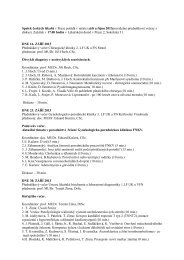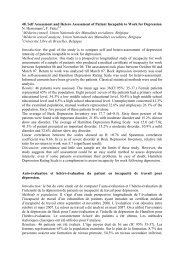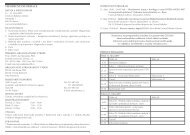ABSTRACTS â ORAL PRESENTATIONS - AMCA, spol. s r.o.
ABSTRACTS â ORAL PRESENTATIONS - AMCA, spol. s r.o.
ABSTRACTS â ORAL PRESENTATIONS - AMCA, spol. s r.o.
You also want an ePaper? Increase the reach of your titles
YUMPU automatically turns print PDFs into web optimized ePapers that Google loves.
P7. MOLECULAR MECHANISMS RESPONSIBLE FOR DIFFERENT MODULATION OF<br />
THE CELL CYCLE PROGRESSION IN COLON CANCER CELLS TREATED WITH LA-12 AND<br />
OXALIPLATIN<br />
Iva Jelinkova 1,2 , Olga Vondalova Blanarova 1,2 , Jarmila Laukova 1,2 , Jirina Hofmanova 1,2 ,<br />
Petr Sova 3 , Alois Kozubik 1,2 , Alena Hyrslova Vaculova 1<br />
1<br />
Department of Cytokinetics, Institute of Biophysics, Academy of Sciences of the Czech<br />
Republic, v.v.i., Kralovopolska 135, 612 65 Brno, Czech Republic,<br />
2<br />
Institute of Experimental Biology, Faculty of Science, Masaryk University, Terezy<br />
Novakove 64, 621 00 Brno, Czech Republic,<br />
3<br />
Platinum Pharmaceuticals a.s., Brno, Czech Republic<br />
ivina@ibp.cz, vaculova@ibp.cz<br />
Platinum-based antitumor agents such as oxaliplatin are used in the therapy of many<br />
solid cancers including colorectum, but their use is limited by serious side effects and<br />
intrinsic or acquired resistance. Therefore, an intensive search for novel more suitable<br />
candidates is still ongoing. Recently, platinum (IV) adamantylamine ligand-containing<br />
complex LA-12 has been introduced and shown as highly effective in many cancer cells<br />
including cisplatin resistant. Platinum-based drugs express their cytotoxicity by creating<br />
adducts on DNA that may result in initiation of DNA damage pathways. Activation of<br />
these pathways leads to halting the progression of the cell cycle, providing the time<br />
for DNA repair or induction of cell death. The key downstream target of DNA damage<br />
signaling pathways is p53 protein, which is essential for the cell cycle arrest, apoptosis<br />
and DNA repair. As a transcriptional target of p53, p21 protein is an important regulator<br />
of cyclins and cyclin dependent kinases.<br />
In our study, we compared the ability of oxaliplatin and LA-12 to modulate cell cycle and<br />
induce cell death in colon carcinoma cell lines HCT116 and RKO, and investigated the<br />
molecular mechanisms responsible for the differences in their response. We observed<br />
that LA-12 exerted cytotoxicity independently on p53 and p21 status, and in significantly<br />
lower concentration than oxaliplatin. Using p53/p21 deficient HCT116 cells, we also<br />
confirmed the indispensable role of these regulators in oxaliplatin-induced G2 arrest<br />
that was accompanied by downregulation of cyclin B1 and active Cdk1 (Flow cytometry,<br />
western blotting). On the other hand, LA-12-induced toxicity was not associated with<br />
p53- and p21-dependent G2-phase arrest and block in M phase entry observed in<br />
oxaliplatin-treated cells. The higher cytotoxicity together with its ability to bypass the<br />
cell cycle arrest important for the cellular damage repair suggest LA-12 as more effective<br />
candidate for elimination of colon tumors with various genetic backgrounds when<br />
compared to oxaliplatin.<br />
This work was supported by IGA Ministry of Health of the Czech Republic NT 11201-<br />
5, Czech Science Foundation P301/11/1730 and European Regional Development Fund<br />
(CZ.1.07/2.3.00/20.0180).<br />
Analytical Cytometry VII 95








